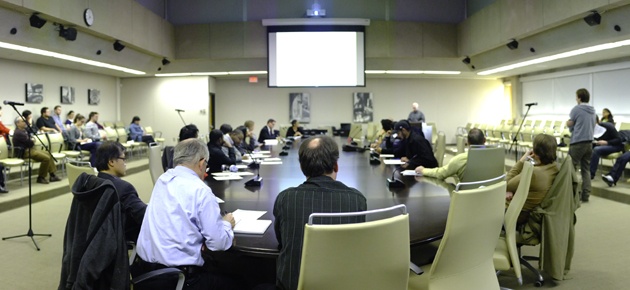The UTM Students’ Union advocated for greater student representation in the university’s decision-making process at the governance town hall last Wednesday.
About a month after tension arose between the chair of the Erindale College Council and UTMSU, union executives expressed concern for the distribution of membership on the proposed UTM Campus Council. Meanwhile, the new boards under the U of T Governing Council will allow for autonomous local planning at the satellite campuses.
Amrita Daniere, vice-dean graduate and chair of UTM’s Governance Review Committee, explained that the better part of the hour-long meeting would be spent on explaining and informing about the proposed reforms to ensure that students in attendance would understand the following discussion. Halfway through, Munib Sajjad, UTMSU’s VP External, interrupted Bill Gough, vice-dean graduate and faculty governor, to request that question period begin. Sajjad wanted to ensure that students would have sufficient time to pose questions. Gough displayed one last slide and the student union began to question the process.
Gilbert Cassar, the president of UTMSU, opened the question period by expressing his concern for fair representation and transparency of information. He wanted assurance that students, as one of the largest stakeholders of the university, would be allotted greater membership on the council.
Since the UTM Campus Council will fall under the Governing Council, the estates will need to comply with the U of T Act—unlike the current Erindale College Council. Governors and alumni will be required to have representation on the new council alongside students, faculty, and administrators.
“Student voices should be heard. There is no desire to exclude student input, and it is highly desirable at all levels of U of T governance. All the major boards include students,” Gough said. “You want a broad representation of your community and the departments. You want all voices to be heard.”
TFOG has yet to determine the composition of the Campus Councils.
Walied Khogali, the executive director of UTMSU, expressed his disappointment in the process, stating that the town hall was more of a lecture with a predetermined structure than a forum to provide suggestions.
“Yes, they proposed a model, but it’s up to the campus to shape this model so that it reflects our needs and priorities,” Daniere said. “The intention of having an open and inclusive review process shows the commitment of this campus to building and shaping a new governing structure that prioritizes inclusivity, transparency, and diversity.”
Students should direct suggestions and questions to the website, Daniere stated.
Gough and Daniere continued to entertain questions after the town hall adjourned.
The Towards 2030 document was created in 2007. It outlines the changes the university will undergo over the next 20 years to achieve higher standards of excellence. The Task Force on Governance was stricken to oversee the restructuring of the university’s decision-making processes and recommended that the Mississauga and Scarborough campuses be given greater autonomy to make decisions on the local level. The UTM Campus Council will have fewer members than the Erindale College Council.
Currently, UTM’s Erindale College Council comprises faculty, administration, and students. The council reviews budgetary matters and academic planning proposals and makes recommendations through a voting process. The agenda then moves to the Governing Council, based at the St. George campus, to finalize decisions.


